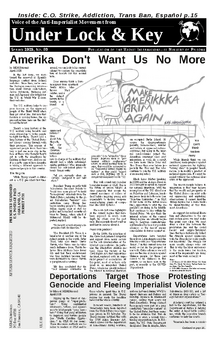
Ruchell Magee

Comrade Ruchell Magee was one of two survivors from the Marin County Courthouse massacre that took General Johnathan Jackson’s life on August 7, 1970 (peace be upon him). Comrade Ruchell Magee is now 84 years old. Ruchell Magee was born in 1939 in Louisiana. He would go on to spend 67 years of his life in unjust captivity, starting the year after the murder of Emmett Till. In 1956, Ruchell Magee (like Emmett Till) was framed in a similar fashion of unfounded accusations of rape, where the victim originally did not identify Ruchell Magee. Nevertheless, he was convicted in a one day trial by an all white jury. After serving 7 years on a 12 year sentence he was released on parole in 1962. Comrade Magee then moved to Los Angeles.
After a 10 dollar quarrel over marijuana ending in a kidnapping charge, Magee was convicted (with little evidence) after a two day trial and sentenced to serve seven years to life on kidnapping charges that legally only carried a penalty of up to the maximum of five years. In 1965 he appealed the charges and was denied. While housed at San Quentin Magee became a jailhouse lawyer. There he met Comrade George who was also serving a Cali-type sentence of one year to life. They were routinely denied by the parole boards. Ruchell was also a major participant in the movement for prisoners’ rights and never stopped fighting for his release.
The Marin County Courthouse Massacre
Around the young age of 15-years old, Johnathan Jackson became politically active witnessing the injustice done to his brother George by the legal system. Johnathan was a very smart student, scoring at the top of his classes.
George Jackson later had Johnathan move in with Angela Davis to keep her safe. There he learned weapons training and dated Angela’s girlfriend who was white. He would later impregnate her before his demise, with a son his mother would deny. A son that would grow into a polar opposite of George Jackson.
The day before the Marin County Courthouse Massacre, Johnathan Jackson sat in the courtroom in a trench with a bag for the trial of James McClain. The next day he visited George Jackson. They spoke, embraced, then left.
A few hours later a Sheriff spotted Johnathan in the courthouse with the same trench coat and bag on from the day before. The suspicious Sheriff approached Comrade Johnathan and asked him: “What’s in the bag?” Johnathan replied:
“Alright gentlemen, freeze. Nobody move. We’ll take over from here.”
After equipping his comrades with artillery the armed defendant James McClain and the witnesses called there for a prison murder, William Christmas and Ruchell Magee, left with the prosecutor, judge, and three jurors as hostages, demanding the release of Comrade George and the guarantee of safety for themselves.
James McClain walked the judge (with a shotgun barrel roped around his neck) to the van with the hostages. As they where leaving the parking lot hundreds of officers took aim on the custom made bullet proof van. A lot of the officials were from San Quentin. As Johnathan was leaving the parking lot holding a handgun out the window he was shot in the hand while holding it out the window.
The rest of the officers opened fire on the van, the shotgun goes off, and the prosecutor snatches the gun off Johnathan’s hand as he brings his hand back in the window with the gun. The prosecutor would then murder Comrade Johnathan, James McClain, and William Christmas. As the Sheriff and state officials continue to shoot the van they eventually shot the prosecutor in the back, paralyzing him. Ruchell Magee was later found unconscious.
Ruchell Magee was charged with murder and kidnapping, along with Angela Davis who allegedly provided Mr. Jackson the guns. In a separate trial Angela was acquitted, but in 1973 Mr. Ruchell Magee was convicted of simple kidnapping and voted 11 to 1 to acquit him of the murder charge.
Even though an autopsy of the judge who had been killed proved Ruchell did not kill him, and no evidence proved Ruchell knew anything about Johnathan Jackson’s plan to liberate the prisoners from the Marin County Courtroom, on 23 January 1973, Magee was sentenced to life in prison.
After the conviction he was denied parole 16 times and housed at high security prisons like Folsom and Pelican Bay’s Security Housing Unit, while he became one of the most consistent and successful jailhouse lawyers and advocates for prisoners.
Earlier in his bid, Ruchell took the name Cinque from the African leader Sengbe Pieh of the 1839 La Amistad slave ship rebellion, insisting that Africans have the right to resist “unlawful” slavery. Ruchell maintains that Black people in the U.$. have the right to resist this new form of slavery which is part of the colonial control of Black people in the country.
“My fight is to expose the entire system, judicial and prison system, a system of slavery. This will cause benefit not just to myself but to all those who at this time are being criminally oppressed or enslaved by this system.”
Ruchell has now been released on a new bill passed in California that allows incarcerated medical leave for those who are at fatal health risks.
Welcome home the G, AKA General Magee
Sources: The Road to Hell, by Paul Liberatore
Ruchell Magee released after 67 years in prison!, by Claude Marks of Freedom Archives








